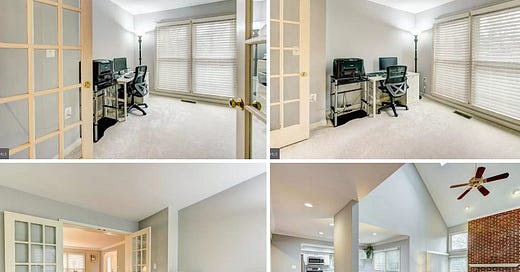I started working from home back in May 2019—close to a year before the pandemic, back when I had a magazine job. Since then, I’ve worked from home/remotely, and since early 2021 I’ve been self-employed.
I really needed to do it back in 2019. We had a small, cramped office, I had a two-hour round-trip commute, traffic had worsened since I began it, and I just wasn’t able to get in a full work day anymore. Working from home saved me probably three to four hours a day and several thousand dollars a year.
I’ve always been philosophically in favor of remote work, too. More time for your family, to work on the house, to mow the lawn, to run errands and cook—the extra couple of hours saved on the commute makes our workdays more efficient and our weekends more free. In my line of work, in-person collaboration is minimal, and very little is lost in professional terms.
I still feel this way, and any time I start to rethink it a little bit, I see some news about corporate bosses demanding butts in seats, I think about how these bosses value control more than productivity, and I come fully back to the pro-remote-work camp.
But I’ve definitely thought a bit about how sustainable it actually is to sit at a table at home or a table at a coffee shop, day after day, for the foreseeable future. Most of my workdays I now spend either at a coffee shop or on the road photographing places for this newsletter.
I enjoy working from home, but now that my life is “thicker” than it was in 2019—my wife is also fully remote at home, there’s another cat, we own a house now—I understand why some of the mid-career folks I knew at my old job said they had trouble focusing at home. The bigger home is and the more you have to do there, the more the contrast between work and home is useful.
To some extent, I’m reverse engineering a commute and an office by working from a coffee shop. Maybe offices exist for a reason; maybe that 10 minutes in the car driving to the shop in the morning is useful psychologically. There’s a temperamental conservatism in this; subordinating your own feelings to the possibility that custom contains wisdom.
One thing I notice, when I am out, is how many different sorts of routines people have. Mothers or groups of mothers coming in with children for a half-hour, study groups, people out shopping on weekday mornings, all different schedules. It reminds me how much possibility there is in not being tethered to an office, but also how little I really use it. You think of the words of Marley’s ghost: “My spirit never walked beyond our counting-house—mark me!—in life my spirit never roved beyond the narrow limits of our money-changing hole.” I mean, not quite, but a similar idea. Working from home is sort of like being in college—it’s so easy to grow your world and also to fall into a rote routine.
When you’re alone, you can lose your sense of yourself. Remote work can do for professional life what smartphones do for your consciousness. It’s sort of like a program constantly running in the background, consuming some fraction of your awareness and brainpower all the time. It’s a shift from the different states of wake up/commute/work/leave/arrive home to a constant semi-state of everything and nothing.
I love it and I’m going to keep doing it. But I’m also going to keep this all in mind, but I wonder how my professional routine might have to evolve over the medium term. Not in terms of the work I do, but in terms of how I do it and what I do in between.
If you’ve been remote for awhile, how do you think about all of this?
Related Reading:
What Does Remote Work Do To Cities?
Thank you for reading! Please consider upgrading to a paid subscription to help support this newsletter. You’ll get a weekly subscribers-only post, plus full access to the archive: over 700 posts and growing. And you’ll help ensure more material like this!




Hybrid is best. Once or twice in office per week helps with a change of pace and seeing your colleagues.
It seems to me that there are so many inefficient things that had a positive side effect of creating little communities. I don't need to go to the bank to cash my check like my grandfather so I am not seeing the teller. Or fast-forwarding, I don't need to order my McDonald's from a person, I can just order on a screen and pick it up on a shelf. The office is just the biggest element of that - so it is not just the person you saw every week and said hello to and maybe knew their name, but it was a family. And a family in all the ways that can be good and bad - you are stuck with them to some degree. The times of boredom or stress could be bonding. I think the really difficult problem is how to be so efficient and not be alone all the time. Can't imagine someone who graduated from college and is starting a job this week, working from home. Their circle is just dramatically shrunk and that is a shame. But on the other hand, it is hard to justify having a bunch of huge buildings for people to do the same thing they can do at home.